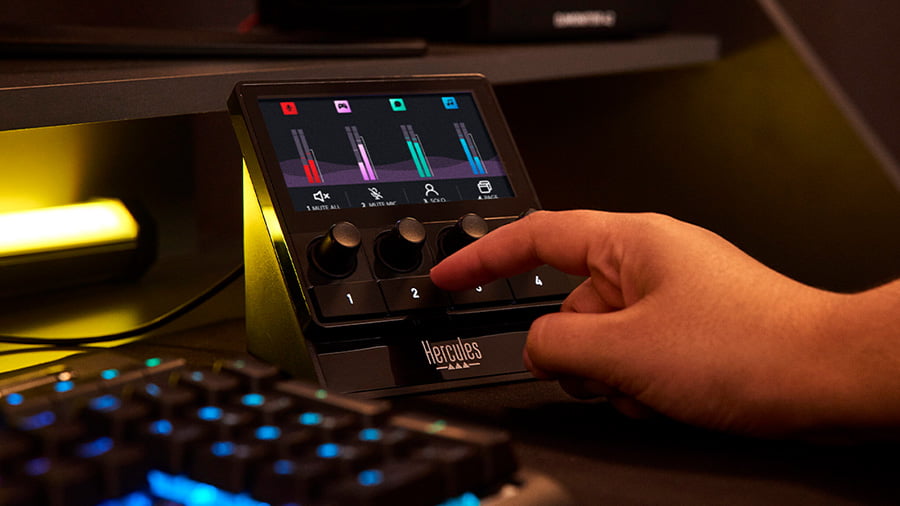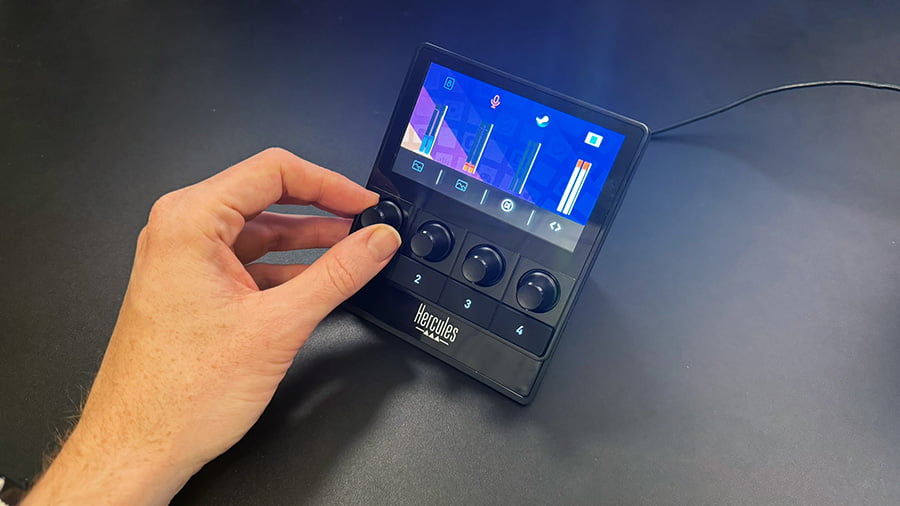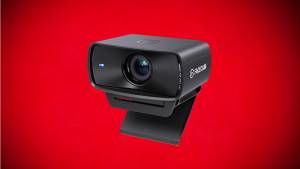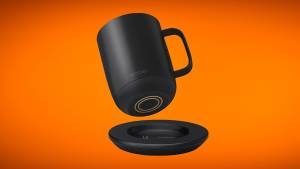Hercules Stream 100 Audio Controller

design
My streaming setup is already busy enough with a mix of microphones, Stream Decks, capture cards and more so I was relieved to find the Hercules Stream 100 is a pretty compact little device. Like modern real estate it looks up rather than out so despite sitting quite tall, the actual desk space it needs is surprisingly limited. It doesn’t feel cramped either, each of the four dials, four buttons and the 4.3” LCD screen all feel like they have room to breathe without being cramped together. The included USB-C cable also features a right-angle connection to keep it neatly tucked behind the unit and runs the cable down the back rather than sticking out which is a thoughtful touch from Hercules.
While the Hercules Stream 100 is an attractive enough looking unit, there’s a disappointing amount of hard plastic covering almost every part of it. Nothing feels particularly premium and you’re consistently reminded that this is a more entry level device. It’s also worryingly light and hollow, tapping my fingers against any part of the Hercules Stream 100 is greeted with an empty, soulless clunk. I can’t help but feel like sticking a rock inside or pumping a load of filler foam into the Hercules Stream 100 would have given it a bit more substance and gone a long way to improving the feel here.

Ultimately given the lower price point I wasn’t expecting metal details like the Elgato Stream Deck Plus, but the dials being entirely empty plastic with no grip texture or rubberisation is a really noticeable cost saving measure that takes the shine off using it. The four dials all offer really low resistance, less than I’d like in truth, and bizarrely I found some were easier to turn than others. They are nicely spaced though and I never found myself accidentally knocking a different dial while trying to turn another.
check latest prices
Thankfully the quality does improve somewhat when you turn your attention to the buttons. While the dials felt cheap, the Hercules Stream 100’s four rubber buttons feel pleasant and classy with a soft and satisfying click. I found it takes just the right amount of effort to get each to fire off while the short travel distance makes them feel responsive and sharp. Each button is large but without any wobble and despite specifically testing presses in each corner as well as the centre of the button, I never noticed misclicks or failed inputs. Very nice.
The most eye-catching element of the Hercules Stream 100 though is undoubtedly the 4.3” LCD screen that dominates the front of the unit. The screen itself is nicely saturated with good brightness and while Hercules doesn’t specify the resolution, it’s sharp enough for the task at hand, though some smaller text does get a little crunchy. It’s a shame there’s no touch support on offer as there’s enough screen real estate for UI items to sit on, but at this price point it’s not surprising and other similar controllers like the BEACN Mix Create don’t offer that functionality either.
performance
Having used the Hercules Stream 100 for a week or two, it’s hard to know where it’s really designed to sit in the market. It’s a curious little box because while what it does it does pretty well, but there’s a lot of things I wish it did that it doesn’t. Still with me?

The ultimate goal of an audio controller like this is to provide quick access to managing and balancing audio levels. To bring a device onto your desk that stops you having to tab out of game because the background music just got a little too intense or to turn up a new Discord call member who’s mic is too quiet. For basic tasks like that, the Hercules Stream 100 is fine and I don’t have any major complaints about how it gets the job done.
It’s worth noting though, unlike other options which offer a more refined set of digital audio devices, the Hercules Stream 100 is essentially a hardware gateway to the basic Windows sound offering. Turning down an app’s volume is doing so at a basic operating system level, rather than something more refined for just your stream.
The Hercules Stream Control app made it pretty simple to allocate audio channels across the inputs, though despite being drag and drop the experience wasn’t as sleek or elegant as offerings from SteelSeries or BEACN. Nonetheless I was able to quickly assign individual apps and my microphone to each dial, though there’s no way to bundle similar types of audio together under a group heading so you’ll need to tweak each app on its own.

This is where the Hercules Stream 100 starts to fall behind the pack and where I begin to question its ultimate value for most streamers. It just can’t stand up to more complex tasks and as a device dedicated to audio I want it to be able to handle all of my audio needs, not just the basics. There’s no sub-mixes for stream and personal output, so no way to route some sounds here but not there. There’s also a bizarre limit of just two pages of inputs. The page functionality is there, why can I only have two, Hercules?
check latest prices
The generously sized LCD screen is a positive however as it offers a nice visual representation of what’s going on with four clear VU metres. The Hercules Stream Control app unlocks the ability to customise the appearance of these dancing bars along with their corresponding icons, colours and even the background image. Making these changes was pretty intuitive in the app with a simply laid out UI.
While the four buttons may look paired to their dial above, each is able to be independently programmed to an unfortunately restricted range of actions. Again it’s the real basics that the Hercules Stream 100 does well, little things like muting and unmuting sources or launching an app work well. Despite OBS integration though, this isn’t a makeshift Stream Deck rival. The range of OBS controls are limited and didn’t feel intuitive, it felt almost like an afterthought rather than a core feature. There’s also no external marketplace for additional plugins for other apps, no way to change what does what based on which app you have open or not even custom hotkey or action support, it just all feels a little undercooked and like a prototype.
summed up
Yes, the Hercules Stream 100 does let you take control of your PC audio and yes it will help you balance your output to a decent degree. But no, this isn’t the killer device that’s going to fundamentally change and improve your stream. The basic functionality is just too basic to be impressed by and the long list of more advanced behaviour that’s missing make this a tricky device to recommend.
Some of this can be explained away by its reasonable £119.99/$149.99 price point, you can’t have audio champagne on an audio beer budget after all, but the return on investment isn’t overly compelling. There are other options from competitors like the Stream Deck Plus that for not a huge amount more, offer far more impressive functionality.














